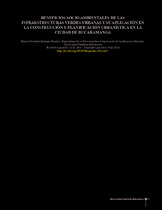Beneficios socio ambientales de las infraestructuras verdes urbanas y su aplicación en la construcción y planificación urbanística en la ciudad de Bucaramanga
Documentos PDF
Resumen
Las constantes emisiones atmosféricas generadas por los vehículos que diariamente circulan por la ciudad de Bucaramanga, generan contaminación del aire a través de la combustión de combustible fósil, estas emisiones afectan directamente a la salud de su población y contribuyen significativamente al conocido fenómeno del efecto invernadero. Con las infraestructuras verdes urbanas como son los techos verdes, jardines verticales, parques lineales entre otros, se fomenta el uso y la conservación de los espacios verdes en la ciudad. A través de su capa vegetal, los espacios verdes generan diversos beneficios tales como: la regulación del confort térmico en la zona y la recepción de gases contaminantes presentes en la atmosfera, a su vez propician un valor estético visual en la zona estableciendo un soporte para la biodiversidad presente en el sector el cual se convierte en un instrumento para la estimulación e interacción social de sus habitantes. Este articulo plantea analizar los beneficios socio ambientales de las infraestructuras verdes aplicables al plano urbano en los métodos de construcción y planificación urbanística en la ciudad de Bucaramanga, como herramienta para hacer frente a los efectos del cambio climático y mejorar las condiciones de vida de la población, identificando los problemas y dificultades por la cual atraviesa la ciudad y referenciando experiencias positivas en otras urbes del mundo, esto para generar conclusiones que acrediten que la aplicación de este tipo de infraestructuras al plano urbanístico efectivamente traerán beneficios tanto como a la salud de la población como al medio ambiente de la ciudad. The constant atmospheric emissions generated by vehicles daily pass through the city of Bucaramanga, air pollution generated by fossil fuel combustion, these emissions directly affect the health of its population and contribute significantly to the known greenhouse phenomenon. With urban green infrastructure such as green roofs, vertical gardens, linear parks among others , the use is encouraged and conservation of green spaces in the city. Through its topsoil, green spaces generate various benefits such as thermal comfort regulation in the area and the reception pollutant gases in the atmosphere, in turn foster a visual aesthetic value in establishing a support area this biodiversity in the area which becomes an instrument for stimulation and social interaction of its inhabitants. This article sets out to analyze the social and environmental benefits of green infrastructure in urban background applicable to construction methods and urban planning in the city of Bucaramanga, as a tool to address the effects of climate change and improve the living conditions of the population identifying the problems and difficulties which crosses the city and referencing positive experiences in other cities in the world , this to generate findings that prove that the application of this type of infrastructure to urban plan effectively bring benefits as well as the health of the population and the environment of the city.
Palabra/s clave
Bucaramanga
biodiversidad
cambio climático
emisiones
espacios verdes
infraestructura verde
planificación urbanística
salud
Green infrastructure
emissions, climate change
urban planning
health, biodiversity
green space
Colecciones
- Vol. 8 No. 2 (2014) [11]
El ítem tiene asociados los siguientes ficheros de licencia:


